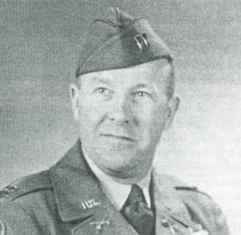Ron’s Canteen *** Lt. Col. John D. Porter
A nice article on Lt. Col. John D. Porter from the Go For Broke Bulletin (Vol. XLVIII No. 3 – July – September 1997) by Ron Oba.
It’s funny how one reminisces and start to treasure the days of old. As one ages, the urge to recapture youth through the acquaintances you haven’t seen or heard from since. It’s as if that the remembrances of old friends and the telling of your life story with the joy of coupling the stories with the names of soldiers you’ve lived with will somehow keep immortality alive. Maybe that is the reason so many of the veterans are now coming in to the Archives for their oral histories so that their legacy will live forever through the retelling of their stories.
John D. Porter, who volunteered for the 442nd from the 34th Division, is one of them. He was here on Oahu at the Waianae R and R Center with his family. He called to say how he remembered the men of the 2nd platoon, Capt. Akins, Capt. Hill, and others. You couldn’t stop him for relating how proud he is as a veteran of the F Co. 442nd. But let him tell you himself in the following taped resume (shortened for the bulletin) and anecdotes he has sent to F Company and the Archives for posterity.
He remembers that the boys prevailed at heart-breaking costs in taking one hill, one road block, one town, and never backing up. He joined into a different environ where everyone spoke a different language called “pidgin” and felt like an outsider who heard English spoken but couldn’t understand it. However, he swears that the 2nd platoon was absolutely loyal to him via body language. Before coming to the 442nd he had lost one of his kidneys and had to fight the medical staff from assigning him to limited service in order to come to F Company. Although he had the highest respect for Capt. Akins, he felt that Akins was suspicious of anyone coming from above the Mason-Dixon line so they didn’t see things eye-to-eye. Once when his glasses broke, he had to come back to C.P. to have it repaired and finally had it wired so he could go back to the Main Line of Resistance. In the meantime, Akins acted like Porter was holding up the entire war.
A most difficult decision he had to make was when one of the boys was mortally wounded and unconscious. Should he send the medic and rifleman to carry the soldier out, or give him morphine to ease the pain and secure him? The platoon had to move out. It was contrary to his lifeguard training to always stay with the victim no matter what. It was the first time he ever left a wounded. He questioned, “Was I ever afraid? Yes. Did we fight when the chips were down? Yes. I was more afraid of showing I was afraid.”
Near Rosignano while approaching Livorno, they were subjected to artillery fire. Every man ran for the hay stack. He took five steps and sank into a sink hole of manure. The men pulled him out with all the stink over him and no one ventured near him for 10 days until he was able to take a good shower and a change of clothing. Along the Arno River he had the first taste of hekka which he insists was cooked with bacon, rice, chicken and onions; after Marseilles, he remembered the constant rain till the tents all fell down; captured 17 German prisoners – marched them back to C.P. where Capt. Akins didn’t have the men to guard them; remembered when Sgt. Jimmy Shimizu was killed by a sniper; saw the boys about to take on three Panzer tanks when our own “junks” came up to put the tanks out of action; and the best steaks he ever ate were the ones Ron brought to the front lines and he and the boys stuck their mud-covered hands into the mermit can and pulled out a steak each.
Porter’s remaining kidney started to act out in the freezing weather until he had to go to the field hospital and treated with sulfur drugs. He talked the doctors to getting back to F Co. and got lost when the M.P.s pointed him and another lieutenant in the wrong direction until they ran into a sign that read Strausburg. He again had to have his ailing kidney treated but this time he was grounded and the only inkling he had of what the 442nd was doing was gleaned from reading the Stars and Stripes. The boys were now on the Riviera, Nice, and enjoying the champagne and mademoiselles.
John says he was still a Captain when he was sent to Korea, came home, then went back to Korea a second time until Mrs. Porter called him that his son was a quadriplegic cerebral palsied child.
He says “Thanks to all you folks, I now have better understanding of the 442nd than when I was with you and I’d like to talk with Akins again. I hope to see you at your next reunion.” John sent me a tape of Lili Marlene in German and English. Call me if you want to listen to it.
